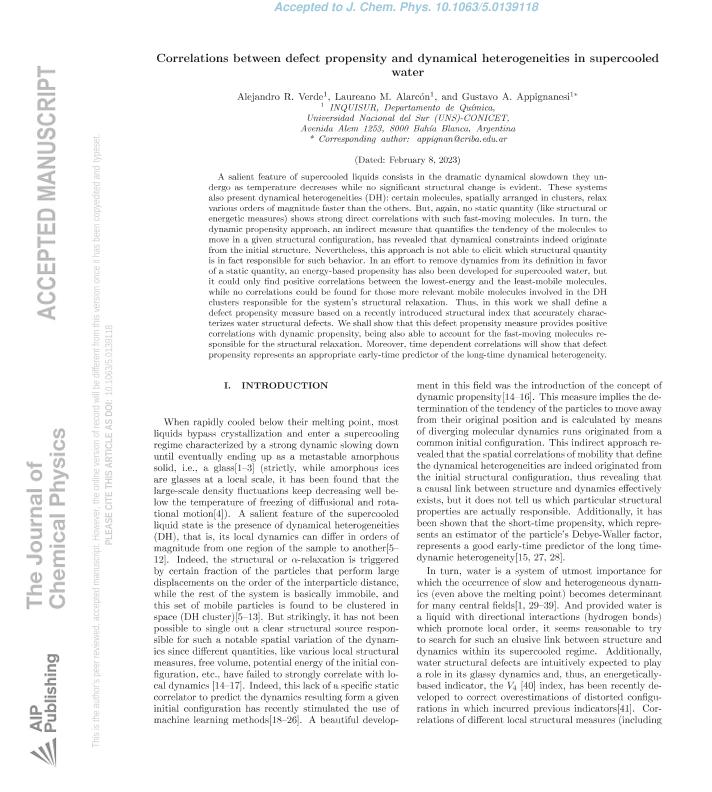Mostrar el registro sencillo del ítem
dc.contributor.author
Verde, Alejandro Raúl

dc.contributor.author
Alarcon, Laureano Martin

dc.contributor.author
Appignanesi, Gustavo Adrian

dc.date.available
2024-04-23T10:45:47Z
dc.date.issued
2023-03
dc.identifier.citation
Verde, Alejandro Raúl; Alarcon, Laureano Martin; Appignanesi, Gustavo Adrian; Correlations between defect propensity and dynamical heterogeneities in supercooled water; American Institute of Physics; Journal of Chemical Physics; 158; 11; 3-2023; 114502-1145086
dc.identifier.issn
0021-9606
dc.identifier.uri
http://hdl.handle.net/11336/233819
dc.description.abstract
A salient feature of supercooled liquids consists in the dramatic dynamical slowdown they undergo as temperature decreases while no significant structural change is evident. These systems also present dynamical heterogeneities (DH): certain molecules, spatially arranged in clusters, relax various orders of magnitude faster than the others. However, again, no static quantity (such as structural or energetic measures) shows strong direct correlations with such fast-moving molecules. In turn, the dynamic propensity approach, an indirect measure that quantifies the tendency of the molecules to move in a given structural configuration, has revealed that dynamical constraints, indeed, originate from the initial structure. Nevertheless, this approach is not able to elicit which structural quantity is, in fact, responsible for such a behavior. In an effort to remove dynamics from its definition in favor of a static quantity, an energy-based propensity has also been developed for supercooled water, but it could only find positive correlations between the lowest-energy and the least-mobile molecules, while no correlations could be found for those more relevant mobile molecules involved in the DH clusters responsible for the system?s structural relaxation. Thus, in this work, we shall define a defect propensity measure based on a recently introduced structural index that accurately characterizes water structural defects. We shall show that this defect propensity measure provides positive correlations with dynamic propensity, being also able toaccount for the fast-moving molecules responsible for the structural relaxation. Moreover, time dependent correlations will show that defectpropensity represents an appropriate early-time predictor of the long-time dynamical heterogeneity.
dc.format
application/pdf
dc.language.iso
eng
dc.publisher
American Institute of Physics

dc.rights
info:eu-repo/semantics/openAccess
dc.rights.uri
https://creativecommons.org/licenses/by-nc-sa/2.5/ar/
dc.subject
Water
dc.subject
Dynamics
dc.subject
Defects
dc.subject
Correlation
dc.subject.classification
Física Atómica, Molecular y Química

dc.subject.classification
Ciencias Físicas

dc.subject.classification
CIENCIAS NATURALES Y EXACTAS

dc.title
Correlations between defect propensity and dynamical heterogeneities in supercooled water
dc.type
info:eu-repo/semantics/article
dc.type
info:ar-repo/semantics/artículo
dc.type
info:eu-repo/semantics/publishedVersion
dc.date.updated
2024-04-22T11:44:33Z
dc.journal.volume
158
dc.journal.number
11
dc.journal.pagination
114502-1145086
dc.journal.pais
Estados Unidos

dc.journal.ciudad
New York
dc.description.fil
Fil: Verde, Alejandro Raúl. Consejo Nacional de Investigaciones Científicas y Técnicas. Centro Científico Tecnológico Conicet - Bahía Blanca. Instituto de Química del Sur. Universidad Nacional del Sur. Departamento de Química. Instituto de Química del Sur; Argentina
dc.description.fil
Fil: Alarcon, Laureano Martin. Consejo Nacional de Investigaciones Científicas y Técnicas. Centro Científico Tecnológico Conicet - Bahía Blanca. Instituto de Química del Sur. Universidad Nacional del Sur. Departamento de Química. Instituto de Química del Sur; Argentina
dc.description.fil
Fil: Appignanesi, Gustavo Adrian. Consejo Nacional de Investigaciones Científicas y Técnicas. Centro Científico Tecnológico Conicet - Bahía Blanca. Instituto de Química del Sur. Universidad Nacional del Sur. Departamento de Química. Instituto de Química del Sur; Argentina
dc.journal.title
Journal of Chemical Physics

dc.relation.alternativeid
info:eu-repo/semantics/altIdentifier/url/https://aip.scitation.org/doi/10.1063/5.0139118
dc.relation.alternativeid
info:eu-repo/semantics/altIdentifier/doi/http://dx.doi.org/10.1063/5.0139118
Archivos asociados
